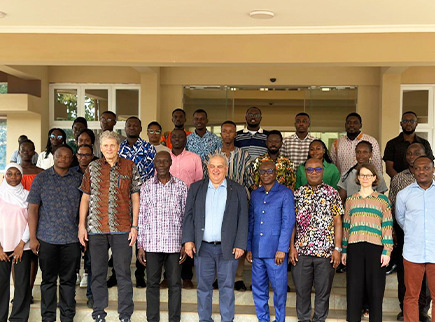The University of Energy and Natural Resources (UENR) and the Kwame Nkrumah University of Science and Technology have lauded the implementation of ‘Professional Education for Renewable Energy in Ghana’ (ProREG) project, sponsored by the German government.
According to the two public universities, the project implementation had created job opportunities for 35 graduates in local and international companies, with 100 students trained in solar PV, bioenergy and energy efficiency.
They expressed appreciation to the German Academic Exchange Service (DAAD) for funding the project and expressed the hope that opportunities would be available for the sustainability of the project for the nation to derive the optimum benefit.
The ProREG, a three-year project was implemented from 2022 to 2025 and aimed at increasing labour market relevance of education in the field of renewable energy in Ghana, with the Technische Universität Berlin (TUB), being the coordinator.
Under the project, new practice-relevant modules in the field of renewable energies were integrated into the curricula of KNUST and UENR with lecturers trained and experienced in agile teaching and learning formats on practical application of renewable energies.
Professor Williams Oduro, a lecturer at the KNUST who highlighted some achievements and impacts, said the project further created opportunities for 41 students to undertake their internships with local and international companies too.
He was speaking at a media engagement on the side-lines of the closing session of the project implementation held at the UENR’s Regional Centre for Energy and Environmental Sustainability (RCEES) of the University of Energy and Natural Resources (UENR) in Sunyani.
RCEES is a World-Bank funded Africa Centre Excellence set to address critical energy and sustainability needs in Africa and beyond.
Prof Oduro said lessons learnt from the project underlined the need to ensure that local ownership was aligned with policy, with industry collaboration being critical for relevance.
Prof Elvis Asare-Bediako, the Vice-Chancellor of the UENR, noted that the project implementation had also bridged the gap between university training and the practical skills demanded by the renewable energy sector.
Through the ProREG project, he said the UENR had developed and piloted new practice-oriented teaching modules in renewable energy, and equipped lecturers with innovative, agile teaching methods.
Prof Asare-Bediako said the institution had also built strong partnerships between academia, industry, and international experts, and created opportunities for students to engage with real-world renewable energy projects, thereby enhancing their employability.
Categories
Editor's Pick
UENR/KNUST laud ProREG project, commend German gov’t

